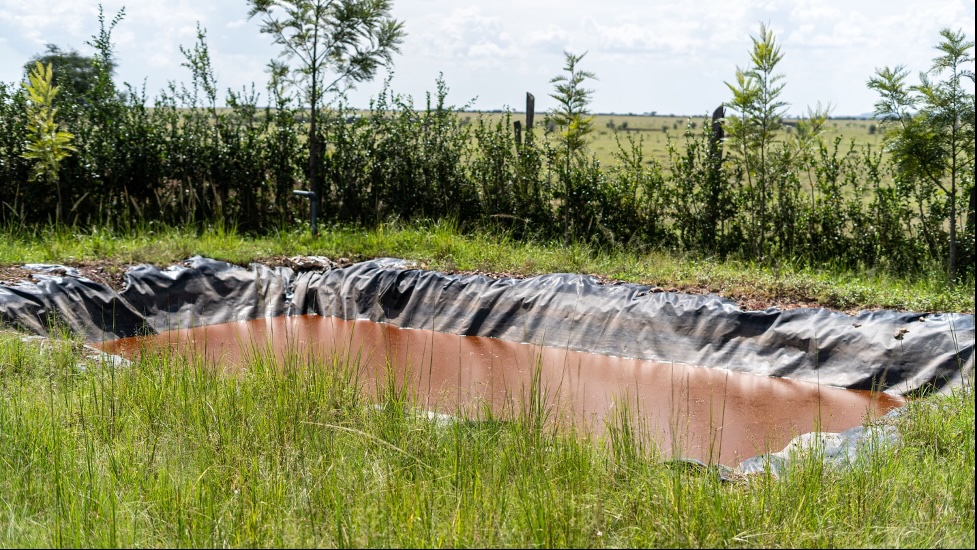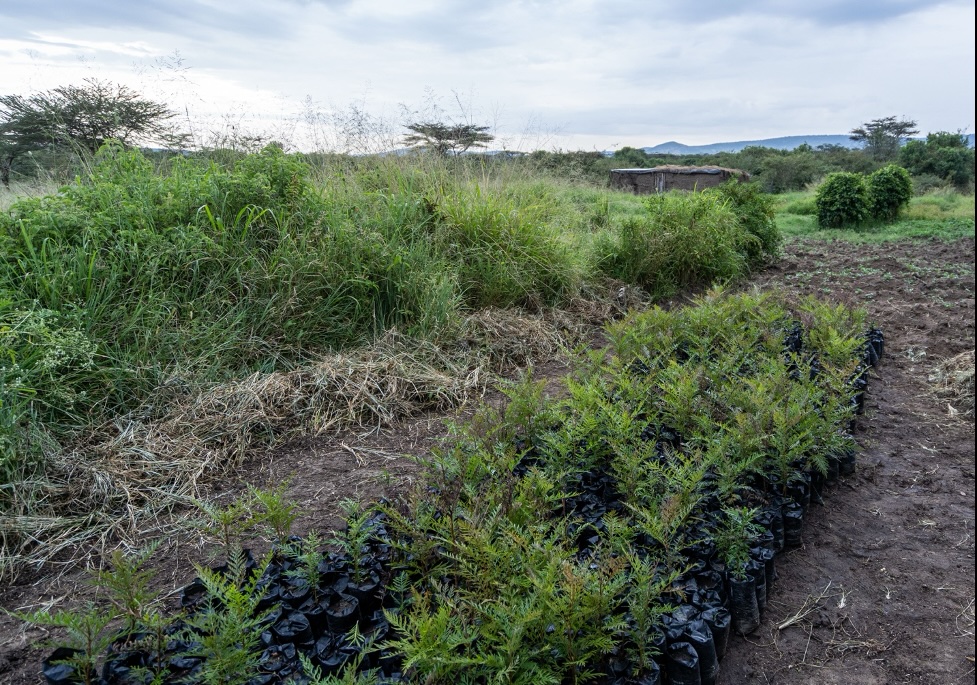
Inspiring Environmental Conservation Among Children and Youth in Nkoilale, Narok County » Capital News
While in grade four, Namelok was inspired by Musangwe Drey, an environmental hero and a former student of this school to join the school environmental club. “One day, he came to our class and spoke to us about the importance of trees and their role in stopping soil erosion. I have since planted 28 trees,” she adds.
Namelok believes that growing trees brings rainfall causing the grass to grow, and providing sufficient pasture for her family’s livestock. She also believes that tree planting not only makes the environment look beautiful but also conserves the environment and stops soil erosion.
“I advise fellow young people to plant more trees as we are helping our country and our community,” she says.
Namelok is just one of the many children in Nkoilale, Narok County who have become tree-planting enthusiasts. This is through an initiative by the Nkoilale Community Development Foundation (NCDF) in partnership with the Kenya Community Development Foundation (KCDF) and the I&M Foundation. The initiative seeks to work through various learning institutions to inculcate a new culture of environmental conservation and primarily targeting the younger generation.
NCDF purposively involves young people in environmental conservation efforts while creating secure learning environments. Established in 2005, NCDF seeks to enlighten and empower communities in Nkoilale, Maasai Mara, Kenya through education, environment and water conservation, community health and economic empowerment programmes.

Nkoilale school children embracing tree planting.
According to the Nkoilale Primary School headteacher Moses Paraiywa, the environmental club that started with a small number of students now has more than 15 members, with more students getting interested in tree-growing initiatives.
“Everybody is interested in the environmental club. Currently, we have both boys and girls as well as younger ones. We are even seeing it more interesting that the young ones are the ones who are very much interested in learning. They have even taken the idea back to their homes,” said Paraiywa.
This environmental conservation initiative, Paraiywa adds, has seen the community embrace tree planting in a big way. “The community has already owned it fully. They are very happy. With support from NCDF, we received the first batch of trees. The community sees it as an investment.

Nelson Kirrokor (L), Moses Paraiywa (In purple shirt) together with learners planting trees at Nkoilale Primary School.
KCDF in partnership with the I&M Foundation has been supporting NCDF in this project which started in November 2020. The three-year project was worth KES. 11,592,799, an amount which comprised KCDF and I&M Foundation’s contribution of KES. 9,315,499 and NCDF’s in-kind contribution of KES 2,277,300.
NCDF Chief Executive Officer Nelson Kirrokor says that school fencing and tree survival rates have had a profound impact on education in the Maasai community, particularly for girls. By creating secure learning environments and preserving the natural resources essential for livelihoods, the project is breaking down barriers to education.
“Through collaboration, empowerment, and environmental stewardship, NCDF is transforming lives and building resilience, says Kirrokor.

NCDF Chief Executive Officer Nelson Kirrokor.
“In our community, it doesn’t rain a lot. Our livestock, and even the wildlife do not have enough water. At some point in time, we had to share water with the wildlife which endangered their survival,” said Magdeline Ntiika, an environmental champion in the Nkoilale area.
She added: “I am so grateful to Nkoilale Community Development Foundation, Kenya Community Development Foundation and their partners for giving women a chance in the community to participate in environmental conservation.”

Magdeline Ntiika, an environmental champion in the Nkoilale area
Through the project, NCDF constructed a water pan for Ntiika to enable her to plant and take care of more trees. She says the initiative supported by KCDF has changed her life as she relies on the water pan during dry seasons not only for growing trees but also for other domestic uses.
“During drought, the water pan lasts me three months. This helps us have plenty of water for our livestock, for our use, and for watering the trees,” she explains. “I feel very happy that I have all these. I no longer have to suffer airborne diseases as the trees prevent excessive dust from entering my compound,” adds Ntiika.

Figure 1:Magdeline Ntiika’s water pan at her home in Narok.
The project motivated Ntiika and she was able to put up another water pan now on her own with a mission to grow more trees including seedlings for distribution to her neighbours. Today, she operates a tree nursery and continues to give out seedlings at a fee even beyond the project.
“Our target was to plant 80,000 seedlings within our Sub County. We surpassed this to 85000, distributed 84000 improved energy-saving jikos in households and to seven learning institutions,” says Ntiika.
She urges young people in her community to join hands in growing more trees. “If the young people in our area can plant more trees, it will be great. We also encourage them to use trees to fence their schools,” says Ntiika.
Before receiving the seedlings, Ntiika’s house stood in an open compound, with patches of shrubs. “My home did not even have a fence. But today I not only live in a decent fenced home, but I also enjoy the privacy and security of my children,” she added.

Nkoilale Primary School Tree Nursery
Ntiika’s locality, Nkoilale, faces environmental challenges due to climate change, population
growth, and overgrazing. The conservation project by KCDF sought to address these issues
through tree planting, energy-efficient solutions, and awareness programs.
According to Emily Omudho, the team lead of Livelihoods Environmental and Natural Resources Management at KCDF, it is crucial for communities to actively take part in the protection of the very environment that they live in.
“We saw the need for communities residing near forests to be active partners in protecting that area. We looked at community partners who were already implementing solutions around the environment and education. That is how our partnership with the community organizations came to be,” says Omudho.
Energy Saving Jikos
In addition to tree growing, the conservation project in Nkoilale aimed at buying and installing energy-saving jikos for members of the community. This was aimed at not only ensuring the community adopts clean energy but also reducing the destruction of trees through the use of wood fuel.
Noolkilorit Letura is one of the beneficiaries of this project. To the mother of four, living in arid rural Kenya made life more difficult. Widowed at a young age, Letura learned to fend for her children single-handedly. The arid lands of Narok County did not make things any better as she had to walk long distances to fetch water, firewood and feed her livestock.
“After my husband died, I struggled to earn a living and fend for my children. The subsequent drought was too harsh to bear. Access to water and firewood was a challenge,” she says.
Letura no longer struggles to search for firewood as she is one of those who received the energy-saving jiko from NCDF. “I used to spend a lot of time every single day walking more than five kilometers to get firewood, and my children always complained about the smoke affecting them while I cooked,” says Letura.

Noolkilorit Letura in her kitchen cooking for children using energy-saving jiko.
By receiving a stipend of KES1,000 to install energy-saving jikos and for her role as a trainer, Letura has gained economic independence, reducing the time she spends on household chores and allowing her to focus on her children’s education. This solution-based approach not only empowers Letura but also enables her to support other women in the community, fostering a cycle of empowerment and sustainable development.
She is grateful to the NCDF and the other partners for the opportunity. “I am now more empowered. This organization also took me through training on environmental conservation, and growing trees that has turned my home green. Besides, I am able to teach even other women the benefits of environment-friendly practices at the household level,” she says.
The energy-saving jiko project is part of KCDF and I&M Foundation’s efforts to empower community organizations to lead clean cooking initiatives alongside environmental conservation.
James Gatere head of I&M Foundation hailed KCDF and NCDF for the partnership that is positively changing the Nkoilale community.
Gatere says that the I&M Foundation is committed to bringing a positive impact in the society, by focusing on skills development education, environmental conservation, and economic empowerment. He adds that changing the mindset of the younger generation for them to understand and have a culture around environmental conservation, remains a priority for the Foundation.
“We want to see lives changed, we want to see children who now think differently about the environment and tree growing. We want to see communities transformed,” he says.
“So when you ask me about success, success would be the children who are planting the trees and are taking care of those trees like pets in their school. And looking at them from the time we began to the time we ended, those trees have grown. And every child feels this is my tree. They have owned it like their pet,” concludes Mr. Gatere.
